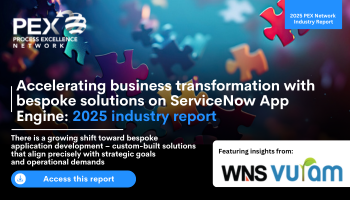C-suite leaders prioritize digital transformation, operational efficiency & AI
Digital transformation, operational efficiency and AI rise above long-standing C-suite priorities like reducing costs and growing revenue
Add bookmark
C-suite leaders are prioritizing digital transformation, operational efficiency and artificial intelligence (AI) in 2025. That’s according to the 2025 C-Suite Survey by Thomson Reuters Institute.
The research examines the attitudes and opinions of C-suite leaders to investigate their main focus areas. The findings of the report are based on a survey of 200 C-suite executives leading enterprises in the US, UK, Canada, Australia, Brazil, Mexico, Germany and France.
Join the PEX Network community

Don't miss any news, updates or insider tips from PEX Network by getting them delivered to your inbox. Sign up to our newsletter and join our community of experts.
Learn MoreDigital transformation, operational efficiency & AI in the spotlight
C-suite priorities reflect the prevailing trends of technology and efficiency. Over the next 18 months, leaders plan to focus on these two strongly linked factors, the survey found.
It is noteworthy that digital transformation (82 percent), improving operational efficiency (64 percent) and exploring and implementing AI (62 percent) rise above long-standing C-suite priorities like reducing costs (30 percent), growing revenue (39 percent) and increasing customer satisfaction (35 percent).
The trend most C-suite leaders expect to have a transformational impact on their business over the next five years is the rise of AI, with 62 percent predicting it to be transformational. An additional 23 percent said AI would have a high impact on their businesses. Closely related to the rise of AI is the anticipated explosion in data volumes, which was cited as the trend with the second-highest impact (74 percent).
Although it is not anticipated to have as transformational an impact, shortage of skilled labor was most frequently cited by C-suite executives as likely having a high impact on their businesses.
Join us at All Access: AI in Business Transformation 2025!
Businesses are making clear digital transformation progress
Organizations are making clear progress with digital transformation, demonstrating the impact that a successful transformation can be expected to have and energizing executives’ support for the initiatives, the report found.
C-suite leaders are optimistic about the progress of digital transformation and predict its benefits with a reasonable degree of confidence. Despite challenges, two in five C-suite leaders say they are very satisfied with their organization’s level of digital transformation, while another 5 percent say they are at least somewhat satisfied. Only 6 percent are dissatisfied
More than half of businesses have a clear digital transformation strategy in place while over 80 percent expect to have a clear digital strategy in place 18 months from now.
Two technologies are driving digital transformation in organizations – cloud computing (86 percent) and generative AI (79 percent), according to the survey. Further down the list are agentic AI (38 percent), blockchain (18 percent) and quantum computing (10 percent).
Leaders satisfied with AI adoption
Just as C-suite leaders feel satisfied with their organization’s progress toward digital transformation, more than half believe that AI adoption at their organization is proceeding at the right pace. Only around one in seven believe that their organization is adopting AI too quickly. Nearly one-third of C-suite leaders believe their organization is moving too slowly when it comes to adopting AI.
Among the earliest benefits of AI in most organizations are improved efficiency/productivity (78 percent), faster response times (65 percent) and better decision-making (56 percent). The biggest barriers to AI adoption are the quality and structure of data (65 percent), budget (55 percent) and regulation (47 percent).
Accelerating business transformation with bespoke solutions on ServiceNow App Engine

Today, off-the-shelf software solutions offer diverse features that enable vast opportunities to implement and maintain business transformation. However, in some circumstances, capabilities lack the flexibility and specificity required to address the unique challenges and workflows of individual organizations. As a result, there is a growing shift toward bespoke application development – custom-built solutions that align precisely with strategic goals and operational demands.
Download this report to explore how enterprises can harness the power of custom applications to drive meaningful transformation. With the growing adoption of low-code platforms like ServiceNow App Engine, organizations are building custom applications faster and with greater control. By empowering both IT professionals and citizen developers to build tailored solutions, organizations can significantly reduce time to value while maintaining control over quality and compliance.
Download Now












